Just In
- 7 hrs ago

- 9 hrs ago

- 10 hrs ago

- 10 hrs ago

Don't Miss
- Movies
 Meetha Khatta Pyaar Hamara First Episode: Avinash Mishra Opens Up On Upcoming Twist In Star Plus Show
Meetha Khatta Pyaar Hamara First Episode: Avinash Mishra Opens Up On Upcoming Twist In Star Plus Show - Sports
 DC vs GT, IPL 2024: Was Prithvi Shaw Out? Fans Question Umpiring Level In IPL Following Controversial Catch
DC vs GT, IPL 2024: Was Prithvi Shaw Out? Fans Question Umpiring Level In IPL Following Controversial Catch - Finance
 DCB Bank Q4 Results: PAT Grew 9% To Rs 156 Cr, NII Jumps 4.5%; Dividend Declared
DCB Bank Q4 Results: PAT Grew 9% To Rs 156 Cr, NII Jumps 4.5%; Dividend Declared - Technology
 OPPO Find X7 Ultra Camera Deep-Dive: Pushing the Boundaries of Photography on a Smartphone
OPPO Find X7 Ultra Camera Deep-Dive: Pushing the Boundaries of Photography on a Smartphone - News
 INDIA Bloc's One Year-One PM Formula Will Destroy Country: PM Modi
INDIA Bloc's One Year-One PM Formula Will Destroy Country: PM Modi - Education
 MP Board Class 10th, 12th Results 2024, Know Alternative Ways to Check Your Result
MP Board Class 10th, 12th Results 2024, Know Alternative Ways to Check Your Result - Automobiles
 Aston Martin Vantage Launched In India At Rs 3.99 Crore
Aston Martin Vantage Launched In India At Rs 3.99 Crore - Travel
 Mumbai Opens BMC Headquarters For Exclusive Heritage Tour
Mumbai Opens BMC Headquarters For Exclusive Heritage Tour
12 Herbal Teas To Boost Immunity During Monsoons; Recipes, Side Effects And Mistakes To Avoid While Preparing
Tea, or as we lovingly call chai, is undoubtedly a national favourite and a huge part of our life, especially during the monsoon season. With the constant downpour and the chilly weather outside, keeping your body warm feels like the right thing to do, and it is!
Apart from the cosy feeling a warm cup of tea can provide during the monsoon season, it also helps stabilise your body temperature and help prevent the onset of monsoon-related allergies and cold.
Herbal teas are indefinitely healthier than regular tea, mainly due to the presence of herbs and spice, making it a healthy blend to ward off monsoon blues. Not all herbal teas are essentially 'tea.' Herbal teas are made from dried fruits, flowers, spices or herbs, and some of the best herbal teas are chamomile tea, peppermint tea, ginger tea, hibiscus tea etc.
This article includes the following:
- Normal Tea Vs Herbal Tea
- Immunity-Boosting Herbal Teas For Monsoon
- Herbal Tea Recipes
- Herbal Tea Side Effects And Cautions
- Best Time To Drink Herbal Tea
- Mistakes To Avoid With Herbal Teas
- Does Tea Really Help Improve The Immune System?
How is herbal tea different from regular tea?
True teas, including green tea, black tea and oolong tea, are brewed from the leaves of the Camellia sinensis plant. On the other hand, herbal teas or tisanes are entirely caffeine-free. Herbal teas are made from dried fruits, flowers, spices or herbs [1].
Here is a list of herbal teas that are healthy and tasty for you to enjoy during the monsoon season.
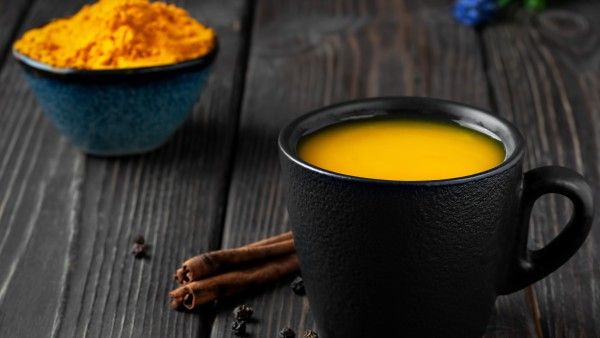
Healthy Immunity Boosting Herbal Teas For Monsoon
1. Turmeric Tea
Turmeric tea is made by brewing grated turmeric root or turmeric powder. It has a unique but subtle flavour and offers an array of health benefits [2]. A perfect warm beverage for the monsoons, turmeric tea, has been shown to boost immunity, manage arthritis symptoms, and regulates blood pressure. Turmeric tea can also be combined with other ingredients like ginger, lemon, honey and pepper to increase the flavour and nutrient profile.
How to make turmeric tea?
- Boil 4 cups of water and add 1 to 2 tsp of ground, grated or powdered turmeric.
- Allow the mixture to simmer for 10 to 15 minutes.
- Strain the tea in a cup and allow it to cool for 5 minutes.
- Add honey, milk, lemon, ginger or black pepper to enhance its taste.
It is safe to consume 400 to 600 mg of turmeric powder three times daily or 1 to 3 g grated turmeric root daily. The best time to drink turmeric tea is in the morning [3].
Caution: Consuming high doses of turmeric tea may cause side effects like nausea and diarrhoea.

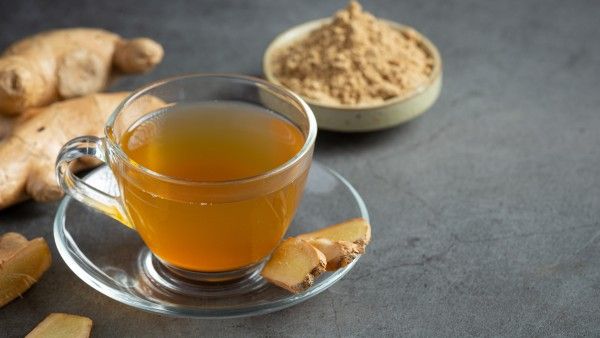
2. Ginger Tea
Ginger tea is known to contain high levels of vitamin C, amino acids, and traces of elements like calcium, zinc, phosphorous, etc. Drinking ginger tea is beneficial for the body and is considered the best when it comes to treating digestive issues. Ginger tea also helps stimulate slow digestion, making it a good option during the monsoons [4].
How to make ginger tea?
- You will need 4-6 thin slices of ginger, honey (preferred amount) and one glass of water.
- Pour the water into a saucepan and boil it.
- Add ginger and simmer the mixture for ten minutes.
- Remove it from the heat and pour out a cup (you can strain it too).
- Add honey as the liquid cools.
You can drink one or two cups of ginger tea per day.
Caution: One possible minor side effect of drinking ginger tea is heartburn or stomach upset.

3. Peppermint Tea
Peppermint tea is made by infusing peppermint leaves in hot water; the leaves contain several essential oils, such as menthol, menthone and limonene, that get released when steeped in hot water. These essential oils give peppermint tea its refreshing minty flavour. Drinking peppermint tea can help ease digestive problems, reduce nasal congestion, lower seasonal allergies and soothes headaches [5].
How to make peppermint tea?
- Boil 2 cups of water.
- Turn off the heat and add a handful of torn peppermint leaves to the water.
- Allow it to steep for 5 minutes.
- Strain the tea and drink.
You can drink peppermint tea throughout the day as it is caffeine-free. Drink peppermint tea after meals to aid digestion in the afternoon to increase your energy levels or before bedtime to help you relax and sleep better.
Caution: People who are allergic to peppermint and people with gastroesophageal reflux disease (GERD) should avoid consuming peppermint tea.
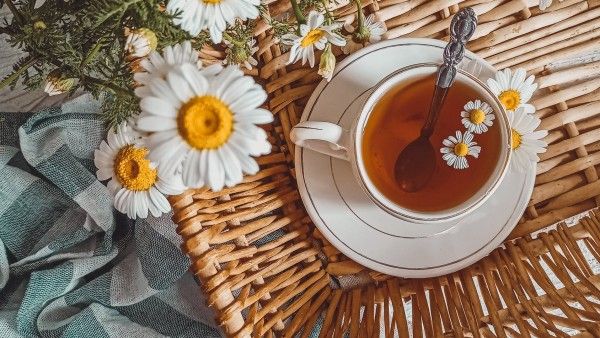
4. Chamomile Tea
Chamomile tea is naturally soothing due to its anti-inflammatory, antioxidant, and astringent properties [6]. Studies have pointed out that inhaling chamomile steam can help relieve symptoms of a cold, including a sore throat.
How to make chamomile tea?
- Add a bit of chamomile powder to a glass of hot boiled water.
- Steep it for about 10 minutes.
- Strain it and drink two times a day.
Chamomile tea can be consumed any time of day but consume in the evening for its relaxing effects and potential sleep benefits.
Caution: When consumed in large quantities, it can cause drowsiness and vomiting.
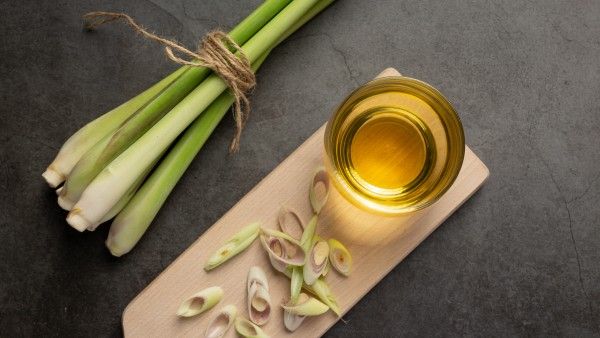
5. Lemongrass Tea
Lemongrass tea is rich in antioxidants, has antimicrobial and anti-inflammatory properties, and help promote healthy digestion [7]. Lemongrass tea may also help in relieving anxiety.
How to make lemongrass tea?
- Pour 1 cup boiling water over 1 to 3 teaspoons of fresh or dried lemongrass.
- Steep for at least five minutes.
- Strain the tea.
- Enjoy while it is warm to reap the benefits.
Caution: Limit yourself to one cup of lemongrass tea a day.

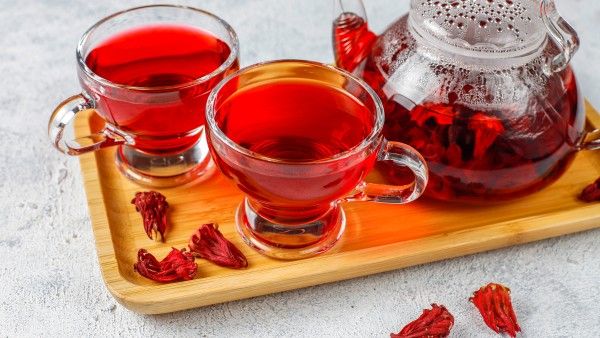
6. Hibiscus Tea
Hibiscus tea, also called sour tea, is made from a combination of dried hibiscus flowers, leaves and dark red calyces (the cup-shaped centre of the flower), which when drunk has a tart taste. Hibiscus tea is loaded with polyphenols and anthocyanins and is beneficial for your heart health and digestion. It is also effective in fighting off bacterial infections [8].
How to make hibiscus tea?
- You will need 2 tsp dried hibiscus flowers, 3-4 cups of water and honey for taste.
- Boil water in a pot.
- Add the dried hibiscus flowers to a cup.
- Pour the boiling water into the cup.
- Allow it to steep for five minutes till the tea becomes red.
- Strain it and add honey to it for taste.
- You can also buy hibiscus tea bags from the store, and the best time to drink hibiscus tea is at night as it contains melatonin (good for sleep).
Caution: Overconsumption of hibiscus tea may cause liver toxicity, dizziness and fatigue. Hibiscus tea may interfere with certain medications like antihypertensive drugs and diabetes medications.

7. Tulsi Tea
Tulsi tea has numerous health benefits and is a great brew to be enjoyed during the monsoon season. Sipping on this herbal tea has both mental and physical benefits, such as stress relief and immunity [9]. In addition to these, tulsi tea is also beneficial for preventing respiratory illnesses.
How to make tulsi tea?
- To make tulsi tea, combine the tulsi and 1½ cups of water in a deep non-stick pan.
- Mix well and cook on a medium flame for 10 minutes.
- Strain the water.
- Add the lemon juice and mix well.
When consumed early in the morning, tulsi tea can help relieve the common cold effectively.
Caution: Tulsi contains eugenol, a substance which, when consumed in large quantities, may cause liver damage, nausea, diarrhoea, rapid heartbeat, or convulsions.

8. Oolong tea
Oolong tea is known to be rich in antioxidants. The nutritional value of oolong tea is high as it contains minerals, iron and vitamins such as calcium, manganese, copper and potassium, vitamins A, B, C, E and K, to name a few. Sipping on oolong tea is shown to help with digestion problems, stress and minor cough [10].
How to make oolong tea?
- Choose a big glass teapot or a pitcher.
- Add two spoons of tea leaves.
- Add lukewarm or cold water.
- Cover with a lid.
- Put in a fridge for at least 6 hours.
- Use within 24 hours.
Oolong is an excellent choice to drink in the morning to help wake you up or as a replacement for black tea during the afternoon.
Caution: Excessive consumption of oolong tea can lead to side effects that can range from mild to serious and include headache, nervousness, sleep problems, vomiting, diarrhoea, irritability, irregular heartbeat, tremor, heartburn, dizziness, ringing in the ears, seizures (convulsions), and confusion.
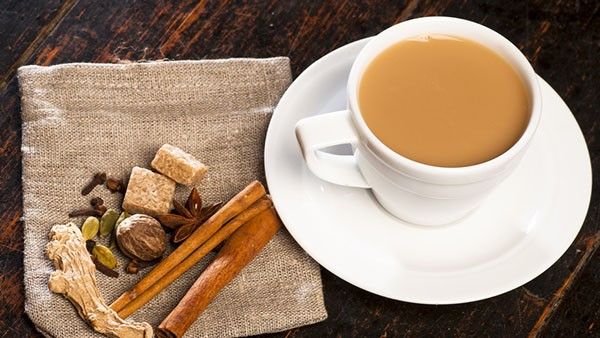
9. Masala Tea
Masala tea is extremely popular in India and is mixture of several ingredients, including cardamom, ginger, cinnamon, black pepper, and cinnamon. It is known to help reduce inflammation, boost immunity and aids digestion, making it a good beverage option for monsoon. It is especially beneficial for the elderly [11].
How to make masala tea?
- You will need four cardamoms, three cloves, ½ inch cinnamon, 2 cups of water, tea leaves, sugar, and ½ ginger.
- Take cinnamon cardamoms, cloves and ginger in a mortar pestle.
- Crush coarsely and keep aside.
- In a saucepan, heat water.
- Let the water come to a boil, and then add the crushed spices.
- Boil the spices along with the water for 2 to 3 minutes.
- Add sugar as per taste.
- Now add the tea leaves and boil for a minute.
- Add milk and boil for 2 to 3 minutes.
- Switch off the flame, strain and enjoy.
Caution: As masala tea contains caffeine, limit consumption. Overconsumption may cause anxiety, migraines, high blood pressure and poor sleep.
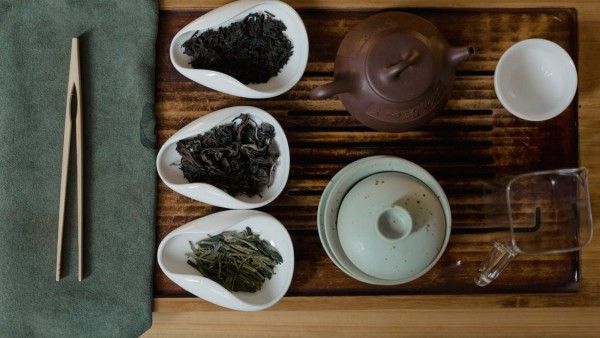
10. Green Tea
Green tea, made from the Camellia sinensis plant, has been popular among the masses for several decades for its immensely professed health benefits, whether it be weight loss, inflammation, or bloating. The tea contains a mixture of polyphenolic compounds like flavanols, flavonoids and phenolic acids, which are specialised antioxidants that are extremely beneficial for your overall health, making green tea a great addition to your monsoon diet [12].
How to make green tea?
- You will need 2 cups water, two teaspoons of green tea leaves and two teaspoons of raw sugar (or honey).
- Take water in a saucepan and let it come to a gentle boil.
- Add any sweetener of your choice and stir. You can skip the sugar if you do not prefer it.
- When the water comes to a boil, add the green tea leaves.
- Cover and steep for 2 to 3 minutes.
- Avoid steeping for a longer time as the tea may become bitter.
- Strain and serve hot or warm. You can add some lemon juice if you prefer.
An hour before bedtime is the ideal time to drink green tea, as it would allow you to empty your bladder and let the drink settle in your body before you get some shut-eye.

Caution: Drinking green tea at night has a few downsides; that is, the caffeine content in the tea may disturb one's sleep cycle.
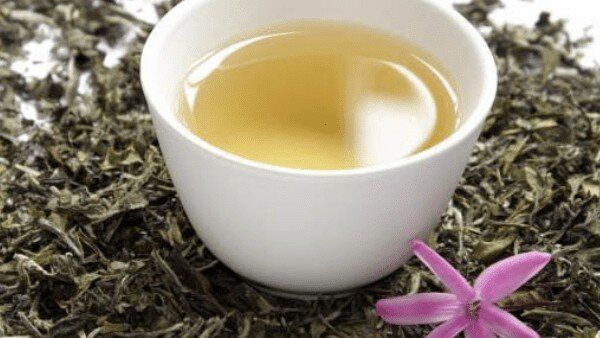
11. White Tea
White tea has a high amount of antioxidants, polyphenols, catechins, flavonoids and tannins. It also contains less caffeine compared to other tea varieties like green tea and black tea [13]. Some of the common benefits of white tea include boosting metabolism, protecting the body from harmful diseases and maintaining a healthy body temperature. White tea is a bit on the costlier side when compared to other herbal teas.
How to make white tea?
- You can enjoy white tea as a hot or a cold brew. In a pot, heat water to a temperature of 170 to 185 degrees Fahrenheit (75-85 degrees Celsius).
- Add two teaspoons of white tea leaves into a cup and now pour the water.
- Allow the leaves to steep for 5 minutes.
- Strain and serve the tea.
- Avoid using boiling water as the tea loses its flavour and nutrients.
Drinking three cups of white tea daily will benefit your health. Drink in the morning after breakfast, in the afternoon after lunch, and the evening. Avoid drinking white tea at night.

Caution: As white tea contains caffeine, drinking too much of it may cause dizziness, insomnia and stomach upset. Pregnant women should consult their doctor before drinking white tea.
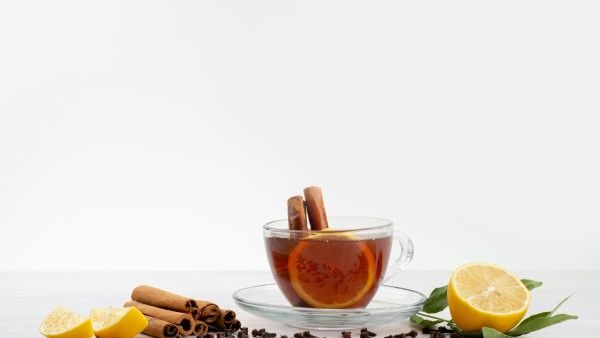
12. Black Tea
Also called Sulaimani tea or simply Sulaimani, this warm beverage is a favourite in the southwestern end of the Indian subcontinent (Kerala). Black tea is rich in antioxidants, known as polyphenols, and has minimal sodium, proteins, and carbohydrates. Black tea health benefits include its impact on boosting heart health and immunity, treating diarrhoea, digestive problem, reducing high blood pressure, lowering the risk of type 2 diabetes and asthma [14].
In order to reap its benefits in its entirety, you need to consume it without any additives like milk and very little sugar.
How to make black tea?
- Boil 2 cups of water in a saucepan on a medium flame for 3 minutes.
- Switch off the flame, add the tea leaves, cover it with a lid and keep aside to 3 minutes.
- Strain immediately using a strainer and discard the tea leaves. You can add lemon juice, mint leaves, ginger and honey to the same.
- Serve the black tea immediately.
Black tea is great to be consumed during the rainy season because the oxidised leaves can help keep you warm during the cold seasons. You can drink black tea after a meal to soothe the digestion process.
Note: Pregnant and breastfeeding women and people with underlying health conditions (and on medication) should always consult their doctor before incorporating anything new into their diet.
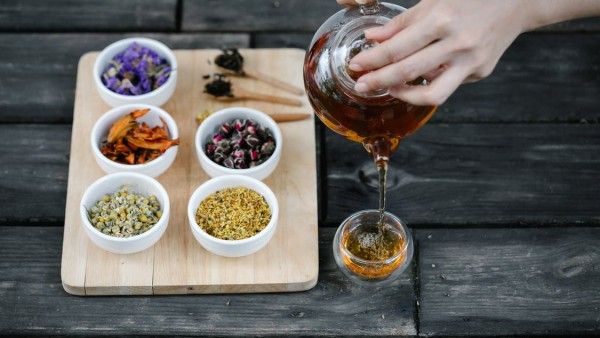
5 Mistakes To Avoid With Herbal Teas If You Want Their Health Benefits
Looking at losing weight, reducing cholesterol, cure for cold, soothe a headache? Then, there is this one best home remedy - herbal tea, for all these health problems and more.The ingredients could be different - tulsi, rosemary, chamomile, ginger, or for that matter, lemongrass tea, but the health benefits they offer are amazing.
However, when preparing herbal tea, the majority of us make certain common mistakes that can make it difficult or even impossible to reaps its maximum benefits [15]. Here is a list of a few of the mistakes that one needs to avoid with herbal tea.
1) Never add milk: Herbal teas are supposed to be lite on the body, which milk is not. Also, milk and tulsi, for instance, are incompatible, as they can cause certain side effects too.
2) Avoid sugar: Adding sugar to your herbal tea would mean adding on more calories. Hence, one should never add sugar, instead use a bit of honey or jaggery for taste.
3) Do not re-heat: Re-heating the tea will burn out the natural herbal benefits. It is best to drink a freshly prepared one; only then it will be serving the purpose for which it is being used.
4) Do not drink it all the time: Herbal tea is not meant to be drunk all the time. For example, drinking tulsi tea early in the morning helps for better digestion. You can consult a doctor or a dietician before taking up any herbal tea.
5) Do not close the lid while preparing: While preparing the herbal tea, it should be ensured that the lid is open and that the water is allowed to evaporate. According to Ayurveda, this helps make the tea rich with the ingredients meant for deriving the herbal tea's health benefits.

Does Tea Really Help Improve The Immune System?
First things first, while tea is packed with several health benefits, this beverage is not a replacement for professional medical treatment if you are sick. Tea has been used in herbal medicine to treat minor illnesses for hundreds of years, and in recent years, scientific studies have supported the same [16].

High in antioxidants and phytochemicals, and a great source of hydration, herbal teas have antiviral and antibacterial properties that can help prevent you from getting sick. While some brews provide more health advantages than others, regularly drinking tea can have a positive lasting impact on your wellness [17]. Herbal teas are the best and easiest cure for those prone to allergies during the rainy season [18].
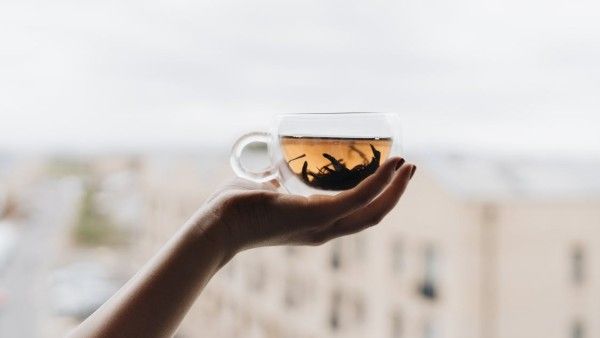
On A Final Note…
The monsoon season brings along several diseases, infections and allergies with it. It is important to take care of your health and consume food and beverages that can help improve your immunity levels. Stay indoors, drink hot fluids and keep your surroundings clean.
Why does fighting off monsoon allergies have to be difficult when you can brew a hot cup of herbal tea!
-
 insyncDolly Chaiwala Earns Praise From Bill Gates On Chai Pe Charcha, Who Is He? Know His Location In Nagpur
insyncDolly Chaiwala Earns Praise From Bill Gates On Chai Pe Charcha, Who Is He? Know His Location In Nagpur -
 healthAdding A Pinch Of Salt To Your Tea Can Transform Your Health, Combats Skin Issues, Migraine, Know The Benefits
healthAdding A Pinch Of Salt To Your Tea Can Transform Your Health, Combats Skin Issues, Migraine, Know The Benefits -
 healthMasala Chai Is The Second-best Non-Alcoholic Beverage In The World, Check The Recipe And Health Benefits
healthMasala Chai Is The Second-best Non-Alcoholic Beverage In The World, Check The Recipe And Health Benefits -
 insyncDo You Always Empty Your Tea/Coffee Cup Or Leave A Little In The Bottom? If So, Why?
insyncDo You Always Empty Your Tea/Coffee Cup Or Leave A Little In The Bottom? If So, Why? -
 insyncThis Karnataka Chaiwala Runs His Shop Like A Boss, Provides 30-Minute Internet For Just Rs 5 A Cup
insyncThis Karnataka Chaiwala Runs His Shop Like A Boss, Provides 30-Minute Internet For Just Rs 5 A Cup -
 healthWorld Heart Day 2023: These Evening Tea Snacks Can Cause Heartburn
healthWorld Heart Day 2023: These Evening Tea Snacks Can Cause Heartburn -
 healthThe Sweet Danger: Unveiling the Hidden Health Risks in India's Chai-Biscuit Ritual!
healthThe Sweet Danger: Unveiling the Hidden Health Risks in India's Chai-Biscuit Ritual! -
 healthWhat Happens When You Drink Black Tea Without Sugar Every Morning?
healthWhat Happens When You Drink Black Tea Without Sugar Every Morning? -
 healthSupercharge Your Weight Loss Journey With Matcha Tea At Home
healthSupercharge Your Weight Loss Journey With Matcha Tea At Home -
 healthMake Tea Time Healthy: 4 Evening Snacks That Promote Weight Loss
healthMake Tea Time Healthy: 4 Evening Snacks That Promote Weight Loss -
 healthAlia Bhatt, Ranbir Kapoor To Priyanka Chopra Jonas Loves Matcha Tea: 5 Reasons Why You Should Too
healthAlia Bhatt, Ranbir Kapoor To Priyanka Chopra Jonas Loves Matcha Tea: 5 Reasons Why You Should Too -
 healthMyth Vs Facts: Does Tea Help With Weight Loss? Let's Learn The Less Known Facts About The Most Popular Beverage!
healthMyth Vs Facts: Does Tea Help With Weight Loss? Let's Learn The Less Known Facts About The Most Popular Beverage!


 Click it and Unblock the Notifications
Click it and Unblock the Notifications





